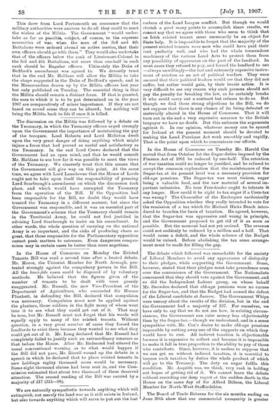In the House of Commons on Tuesday Mr. Harold Cox
moved that from October 1st the Sugar-duties imposed by the Finance Act of 1901 be reduced by one-half. The retention of war taxation could no longer be justified, and he refused to accept the common explanation that the maintenance of the Sugar-tax at its present level was a necessary provision for old-age pensions. The Sugar-tax was most vicious, sugar being a valuable food, and the raw material of several im- portant industries. No true Free-trader ought to tolerate it any longer. How could it be right to tax sugar if a Corn-tax was wrong ? The Chancellor of the Exchequer sardonically asked the Opposition whether they really intended to vote for the remission of a tax which Sir Michael Hicks Beach .intro- duced to broaden the basis of taxation. He agreed, however, that the Sugar-tax was oppressive and wrong in principle, and the Government proposed to get rid of it as soon as possible. But the moment had not yet arrived. The revenue could not suddenly be reduced by a million and a half. That would cause a deficit, and the whole scheme of the Budget would be ruined. Before abolishing the tax some arrange- ment must be made for filling the gap.






































 Previous page
Previous page